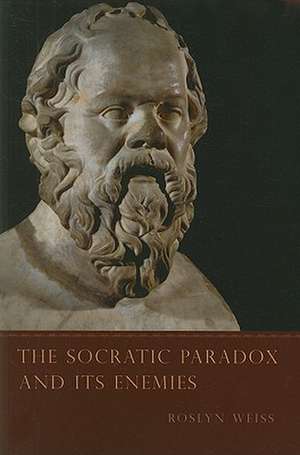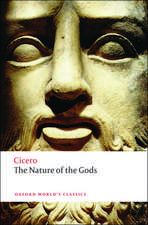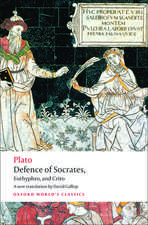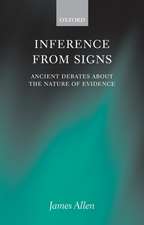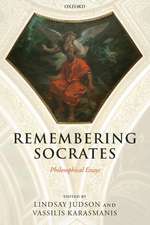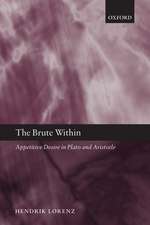The Socratic Paradox and Its Enemies
Autor Roslyn Weissen Limba Engleză Paperback – 18 sep 2008
In The Socratic Paradox and Its Enemies, Roslyn Weiss argues that the Socratic paradoxes—no one does wrong willingly, virtue is knowledge, and all the virtues are one—are best understood as Socrates’ way of combating sophistic views: that no one is willingly just, those who are just and temperate are ignorant fools, and only some virtues (courage and wisdom) but not others (justice, temperance, and piety) are marks of true excellence.
In Weiss’s view, the paradoxes express Socrates’ belief that wrongdoing fails to yield the happiness that all people want; it is therefore the unjust and immoderate who are the fools. The paradoxes thus emerge as Socrates’ means of championing the cause of justice in the face of those who would impugn it. Her fresh approach—ranging over six of Plato’s dialogues—is sure to spark debate in philosophy, classics, and political theory.
“Regardless of whether one agrees or disagrees with Weiss, it would be hard not to admire her extraordinarily penetrating analysis of the many overlapping and interweaving arguments running through the dialogues.”—Daniel B. Gallagher, Classical Outlook
“Many scholars of Socratic philosophy . . . will wish they had written Weiss's book, or at least will wish that they had long ago read it.”—Douglas V. Henry, Review of Politics
Preț: 265.30 lei
Nou
Puncte Express: 398
Preț estimativ în valută:
50.76€ • 53.14$ • 42.00£
50.76€ • 53.14$ • 42.00£
Carte tipărită la comandă
Livrare economică 07-21 aprilie
Preluare comenzi: 021 569.72.76
Specificații
ISBN-13: 9780226891736
ISBN-10: 0226891739
Pagini: 248
Dimensiuni: 152 x 229 x 20 mm
Greutate: 0.34 kg
Editura: University of Chicago Press
Colecția University of Chicago Press
ISBN-10: 0226891739
Pagini: 248
Dimensiuni: 152 x 229 x 20 mm
Greutate: 0.34 kg
Editura: University of Chicago Press
Colecția University of Chicago Press
Notă biografică
Roslyn Weiss is the Clara H. Stewardson Professor of Philosophy at Lehigh University. She is the author of Socrates Dissatisfied: An Analysis of Plato’s ‘Crito’ and Virtue in the Cave: Moral Inquiry in Plato’s ‘Meno’.
Cuprins
Acknowledgments
1. Introduction: The Fight for Justice
2. The Protagoras: "Our Salvation in Life"
3. The Gorgias: How Ought a Human Being to Live?
4. The Hippias Minor: "If There Be Such a Man"
5. The Meno: Desiring Bad Things and Getting Them
6. Republic 4: "Everyone Desires Good Things"
7. Laws 9: All Just Things Are Beautiful
8. Conclusion: Socrates Reconsidered
Notes
Works Cited
Index
1. Introduction: The Fight for Justice
2. The Protagoras: "Our Salvation in Life"
3. The Gorgias: How Ought a Human Being to Live?
4. The Hippias Minor: "If There Be Such a Man"
5. The Meno: Desiring Bad Things and Getting Them
6. Republic 4: "Everyone Desires Good Things"
7. Laws 9: All Just Things Are Beautiful
8. Conclusion: Socrates Reconsidered
Notes
Works Cited
Index
